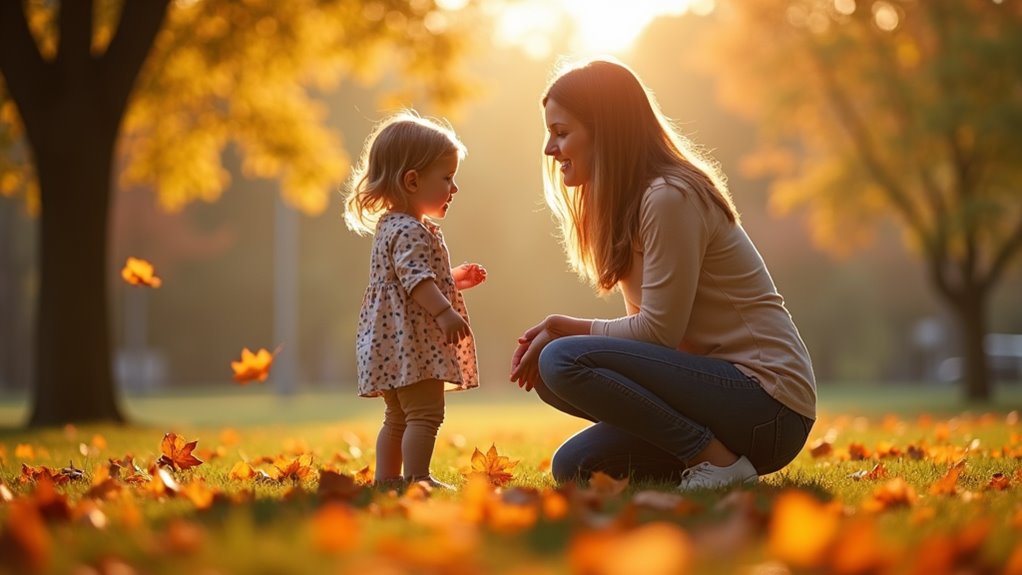Emotional regulation plays a big role in parenting, helping you handle stress and teach your kids to manage their feelings, too. When you stay calm during chaos, your children learn how to navigate tough situations. Plus, if you model emotional awareness, they'll feel safe expressing their own emotions. This builds trust and strengthens your relationship. You'll also notice that a balanced emotional state can make family life more enjoyable, reducing drama and misunderstandings. As you encourage open conversations and fun activities, you're not just easing their worries—you're giving them tools for life's ups and downs. Stick around to explore more tips!
Understanding Emotional Regulation
Understanding emotional regulation is essential for effective parenting. When you manage your own emotions well, you're setting a great example for your kids.
Think of it this way: if you're calm when life gets chaotic, your children are more likely to learn how to stay calm, too. It's like showing them how to ride a bike; they need to see you balance before they can take off on their own.
Emotional regulation means recognizing your feelings, understanding them, and responding in a healthy way. Instead of yelling when you're frustrated, you might take a deep breath or count to ten. This not only helps you but also teaches your kids that it's okay to feel upset or angry; it's how you handle it that matters.
Imagine how your child might feel seeing you manage stress without losing your cool—pretty inspiring, right?
Of course, nobody's perfect! We all have our moments, and that's okay. The key is to learn from those times.
Impact on Parenting Styles
Emotional regulation directly influences your parenting style and how you interact with your children. When you manage your emotions well, you're more likely to be calm and patient. This means you can respond to your kids' needs without losing your cool, which is super important. If you're feeling overwhelmed, you might end up being strict or harsh, and that can lead to misunderstandings.
On the flip side, when you're in control of your emotions, you can be more nurturing and supportive. Your kids will notice your positive vibes, and it creates a warm atmosphere at home. It's like a cozy blanket on a chilly day—everyone feels safer and happier.
Different parenting styles, like authoritative, permissive, or uninvolved, can also be affected by your emotional state. If you're emotionally balanced, you're more likely to use an authoritative style, which combines rules with warmth.
But if you struggle with emotional regulation, you might lean towards being too lenient or overly strict. Remember, your emotional health directly shapes how you guide your kids, so it's worth paying attention to! After all, they're watching you, and you want to set a great example.
Enhancing Parent-Child Relationships
When you prioritize emotional regulation, you create a foundation for stronger parent-child relationships. It's like building a sturdy bridge between you and your child; with good emotional skills, you can cross any stormy waters together.
When you manage your own feelings, you model how to handle emotions for your little one. They'll see how you stay calm during a tantrum or how to cheerfully fix a misunderstanding.
Being in control of your emotions helps you respond better to your child's needs. Instead of reacting out of frustration, you'll be able to listen and understand their feelings. That opens the door for trust and communication. Imagine your child feeling safe enough to share their worries with you—that's priceless!
Plus, when you share happy moments and laughter, it strengthens your bond even more. Think of family game nights or silly dance parties; those moments count!
Embracing emotional regulation means you're not just a parent—you're also a partner in this adventure called life. So, take a deep breath, smile, and remember, your ability to stay cool is the secret ingredient in creating a loving, supportive relationship with your child.
Emotional Development in Children
Children often experience a whirlwind of emotions as they grow, making it essential for parents to recognize and support their emotional development. Each day brings new feelings—joy, sadness, anger, and everything in between. You might notice your child giggling one moment and pouting the next. That's totally normal! It's all part of figuring out how to handle their feelings.
As a parent, you play a huge role in helping your child learn about emotions. When they feel happy, celebrate with them!
But if they're upset, it's important to listen and offer comfort. You can help them name their feelings, like saying, "I see you're feeling frustrated." This can make a big difference in how your child understands their emotions.
Strategies for Effective Regulation
Steering through the ups and downs of emotions can be challenging, but you can implement effective strategies to help your child regulate their feelings.
First, model emotional awareness. When you express how you feel, like saying, "I'm frustrated right now," it teaches your child to identify and label emotions.
Next, create a safe space for them to share their feelings. Encourage open conversations, and let them know it's okay to feel sad, mad, or confused. Use tools like feeling charts or emotion cards to help them recognize what they're experiencing.
Another fun strategy is to practice deep breathing together. You can pretend you're blowing up a balloon! Inhale through your nose, hold it for a moment, and exhale slowly. This not only calms you both but also gives your child a tool for when they're feeling overwhelmed.
Lastly, encourage play. Sometimes, a good game or a silly dance can shift the mood and help regulate emotions.
Long-term Benefits for Families
Implementing effective emotional regulation strategies not only helps your child in the moment but also fosters long-term benefits for the entire family. When you teach your children how to manage their feelings, you're setting the stage for better communication and understanding between all family members.
Think of it as building a bridge over troubled waters!
As your kids learn to express their emotions appropriately, you'll notice less drama during family discussions. No more shouting matches over spilled milk, right? Instead, you might find everyone sharing their feelings, which can lead to stronger relationships and fewer misunderstandings.
Plus, as your children grow, these skills will help them navigate friendships and school challenges. Kids who can regulate their emotions often have better academic performance and social skills. It's like giving them a toolkit for life!
In the long run, the emotional health of your family improves, too. You'll create a warm, supportive home where everyone feels valued.





